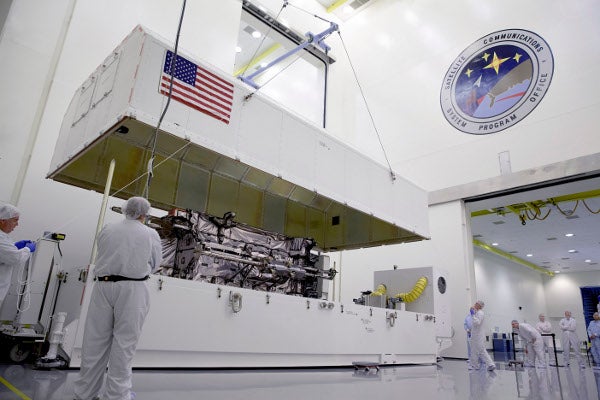
The US Air Force’s (USAF) next-generation Global Positioning System III (GPS III) satellite has successfully established remote connectivity and also communicated with its operational control system (OCX) during the compatibility and integration (C&I) testing at an undisclosed location.
During testing, the Lockheed Martin-built satellite’s prototype, GPS III non-flight satellite testbed (GNST) confirmed its ability to connect with and receive commands from Raytheon’s launch and check out system (LCS) as part of the OCX, which supports the satellite and lessens risks prior to launch.
Currently residing at Cape Canaveral Air Force Station (CCAFS) in Florida, the GNST received commands from the launch and checkout capability (LCC) node at Lockheed Martin’s Pennsylvania facility, through the OCX servers at Raytheon’s facility in Colorado, and then returned satellite telemetry to the control station.
Raytheon GPS OCX programme manager Matthew Gilligan said the test was an invaluable early opportunity for demonstration of GPS III’s command and control with LCS, proving the end-to-end system capabilities prior to the actual launch.
"The positive results tell us that we are right on track for the first GPS III launch," Gilligan said.
Lockheed Martin Navigation Systems mission area vice-president Keoki Jackson said: "While we have connected OCX with ground-based simulators before, these C&I tests were the first time that OCX and a GPS III satellite have actually communicated."
How well do you really know your competitors?
Access the most comprehensive Company Profiles on the market, powered by GlobalData. Save hours of research. Gain competitive edge.

Thank you!
Your download email will arrive shortly
Not ready to buy yet? Download a free sample
We are confident about the unique quality of our Company Profiles. However, we want you to make the most beneficial decision for your business, so we offer a free sample that you can download by submitting the below form
By GlobalDataThe GNST is dry-running launch base space vehicle processing activities and pre-launch testing, which all future flight GPS III satellites are scheduled to undergo as of July at CCAFS.
Capable of controlling all legacy and new military and civil signals, the OCX is an advanced operational gateway service expected to revolutionise GPS command and control and mission management capabilities, and also provide protection against evolving cyber threats.
Both GPS III satellites and OCX represent critical elements of the USAF’s initiative to affordably upgrade the GPS enterprise, while enhancing capabilities to address the evolving requirements of military, commercial and civilian users worldwide.
Currently under contract for the production of the first four GPS III satellites (SV 1-4), Lockheed is scheduled to deliver the first satellite in 2014 for planned launch in 2015.
Image: The GPS III non-flight satellite testbed successfully confirmed its ability to connect with and receive commands from the operational control system (OCX). Photo: courtesy of Lockheed Martin.




